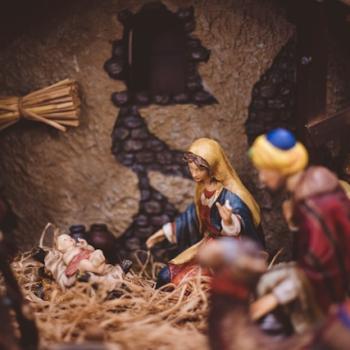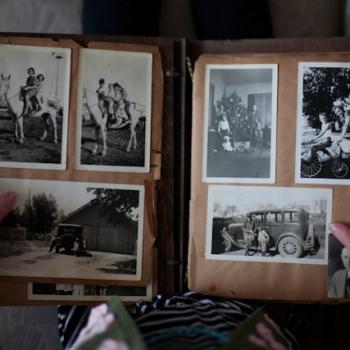
In last week’s post, I looked into how The Martian. I address how it speaks about the church and the Christian community supporting individuals committed to God’s Mission. This week, I want to dig into the concept of mission more from a different perspective. The quickly forgotten and frankly terrifying animated movie 9 contains a powerful message about how the greatest motivation to go out into a dangerous world is love.
One of the most powerful sermons I’ve ever heard urged Christians to remember that this work is not a “cruise ship”, but rather a “battleship”. For passengers on a cruise ship, comfort an happiness is the greatest value. They will sacrifice money, time, and others in order to attain that. A battleship, however, has a mission to complete. For that mission to be completed, the passengers must put it as their highest value. They put themselves in situations that are uncomfortable, and sacrifice much in their lives to serve the mission of that battleship.
Sadly, especially in the Western World, we live as if we are on a cruise ship. We willingly lay aside anything for happiness. It’s in our constitution, here in the US. Marriages, bank accounts, unborn babies, families and lives are lost daily in the name of “happiness.
It is only if we readjust our set of values that we can change our values and be willing to go out and love the world.
Love that Goes in a Dangerous World
Imagine, for a moment, that when you open your eyes for the first time, you are not in a safe place. For many of us, even if our families of origin were unsafe, our first moments in this life are not necessarily dangerous. We have food, water, warmth, and comfort, or we wouldn’t survive to read this.
That being said, it doesn’t take a lot of imagination to put ourselves in the place of 9, the tiny robot, or “stitchpunk” from the animated film of the same name. Even if we have not had the physical sensation of waking up in a world of destruction and danger, most of us have experienced the spiritual equivalent. Disillusionment.
At some point, you and I opened our eyes and realized this world is not safe. It is not physically safe. From accidents and tragedies to malicious actions, our lives and health are at risk every day. It’s not emotionally safe. Even if you can find someone who will not leave, physical death will separate you one day. To love is to know pain. It’s not spiritually safe. Not only does the world press in against our faith, but Scripture makes it clear that we are fighting against spiritual powers (Ephesians 6:12)
In the movie 9, the lead character is a small robotic thing animated by a portion of his creator’s own spirit. He finds himself in a harsh post-apocolyptic world with no understanding of the dangers dangers lurking there.
Within a few short hours of stumbling out of the lab, 9 is greeted by another stitch punk picking through tides of garbage in search of treasures. 2, identified by the number on his body, is a kind thing. He introduces 9 to his own voice and the basics of the world around them. This is only until the two are attacked by a horrific creation of bone and machine. 9 is saved by 2’s self-sacrifice, but 2 is carried off to the lair of the bone cat.
Not long after, 2’s clan begrudgingly takes in 9. They are a group of stitchpunks with their own number identifications. They are led by 1, a world-weary, overly-cautious robot who insists that the only means for survival is isolation. He does not trust outsiders. He does not take risks. Most importantly, he will not allow for a rescue attempt to be made to rescue 2.
Risk and Revenge.
Of course, we know that 9 is going to rescue his first friend. After teaming up with 5, an already damaged stitchpunk from the clan, he launches a rescue attempt. The rescue is initially successful, and the bone cat monster is killed. However, the trio awakens a far worse threat.
They bring to life the fabrication machine, a spiderlike robot created by the same scientist who later created the stitchpunks. The B.R.A.I.N. as it is also called, was responsible for the fall of man. Not only that, but it seems to be powered by the pieces of the scientist’s soul in the stitchpunks. Immediately it consumes 2 and turns its full attention onto hunting down the remaining bots.
The rest of the runtime of the film focuses on the fabrication machine as it creates and animates horrific machines and sends them after the clan. One after another is killed, and 1 places the blame on 9’s shoulders.
9, however, realizes that he may be able to save the souls of the stitchpunks killed before. Though the effort costs many more lives, the remaining stichpunks are able to kill the fabrication machine and free the souls. The only stitchpunks left alive in the end are 9 and 7, the only female stitchpunk.
They release the souls, seeing that they are at peace.

How Will they Know
In 2013 John Allen Chau, a young American missionary, asked fishermen to leave him on North Sentinel Island. The Sentinelese have lived in isolation for generations, rarely interacting with modern travelers, and only then from a distance. They were, however, known to be violent.
John Allen Chau lost his life in an effort to preach the gospel to this unreached people group. After his death, Chau was mocked and hated. The internet cast him in the light of a radicalized extremist who risked exposing the natives to disease and death by stepping foot on the island. They celebrated his death, even giving him the “Darwin Award.”
In 1955 five American Missionaries landed at the Cuaray River in Ecuador in an attempt to reach the Huaorani People of Ecuador. This tribal group was well-known and feared by their neighbors. They lived by the spear, in a constant state of war and revenge.
The natives seemed relatively receptive to the missionaries at first, accepting gifts dropped to them and coming to meet with the missionaries on the beach. On January 8, 1956, a native man convinced the others that these missionaries would hurt them, and needed to be killed before they could cause harm.
Jill Elliot, Nate Saint, Ed McCully, Roger Youderian, and Pete Fleming were killed and their bodies were thrown in the river.
Years later the wives and children of these missionaries returned to the same tribe that had brutally murdered the men. Because of their efforts, and because of the legacy of the men who had gone before them, the tribal people heard the gospel. Many became believers and the cycle of murder and war ended.
Sometime between 64-65 AD the apostle Paul was held prisoner, and later beheaded for his faith ending a life of missionary service. He was one of the first and most prolific “missionaries” as we know them. The other apostles served mostly Jews. The gospel itself was spreading quickly, but that was mostly due to the threat of persecution driving Christians out of Israel. As they ran, they preached the gospel. They began churches where they settled. Most, however, did not start out with the intention of bringing the faith to unreached people groups.
Paul, who had been a source of that persecution before an encounter with Christ, changed that and began a tradition of long labor and service that my own family had the joy to take part in. Throughout the history of missionary work, many have followed in the path of Paul. Many have lost their lives. You can learn more about the sacrifices of missionaries, local teachers, pastors, and Christians, The Voice of the Martyrs is an excellent resource.
Missionaries are not the only people who live “on mission”. Pastoring a church may look like a one-day-a-week job, but in reality it is a job that never stops. I remember personally being on the phone at ten and eleven at night with my pastor and his wife while my mother was in the hospital.
These days even sharing the gospel between friends can be a risk. It is not understood as loving or kind. Instead its seen as arrogant. As an imposition.
Love That Won’t Stay Silent.
Paul said about mission work “How will they (people) call on Him (Christ) in whom they have not believed? And how will they believe in Him whom they have not heard? And how will they hear without a preacher?” (Romans 10:14). Modern faith often argues about the nature and reality of hell, the devil, and what sin is. However, even if we choose not to consider the eternal consequences, most Christians can speak to the power of a life rooted in Christ.
Science supports the power of many Christian practices such as meditation (Prayer), daily reading, community involvement, strong family structure, and health and wellness. We also see some of the damage done when those Christian guidelines are ignored. It may seem logical that marriage lasts longer if you can “try it out” by sleeping around and living with your partner before marriage. Thats categorically not true. In fact, it along with things like porn, can rewire the brain in some disturbing and painful ways.
The reason we have a weekend, for instance, is because of Biblical law. God highlights the need for rest, good food, and family in the Garden. Whether or not you agree with the law, God gives us a powerful action to take to deal with sin, brokenness, and sorrow. How many therapists now encourage a need to work through your guilt and shame rather than just trying to cover it or ignore it?
od acts on behalf of the slaves, the unloved women, and the broken, even if they are not traditionally righteous. And yet, He doesn’t just throw away the people we would identify as the perpetrators. Instead, He redeems both.
Media like The Handmaiden’s Tail might make you believe that truly applying the Bible to our lives would be disastrous. Instead, I see that God’s people have always lived with joy and purpose with laws far more kind and fair than those of the nations around them.
There is more besides.
Christianity is the only religion where God comes to us, rather than demanding we reach Him. The gospel shows us a God who is perfectly just, and yet perfectly loving. He will not allow sin to go unpunished not because of how it affects Him, but of how it harms us. Yet, instead of letting us take the consequences on ourselves, He let his own Son die. He went to the cross.
This is the only place you can find true, unconditional love. Any human love must pull back when there is pain. Boundaries are so essential because we mentally and physically cannot withstand hurt. At some point, even the strongest love will be broken. Only God is capable of truly unending love. This is the type of love we all MUST have. Without it, we wither away.
Can you fully wrap your head around that? We are not loved because of who we are, but in spite it. No matter what we do, or have done. We don’t need to change, but we can’t help to be changed. God loves the broken addict on the street as much as he loves the holiest of priests.
Because we are not loved because of anything we have done, we cannot lose it.
If we truly love people, and we truly believe what we claim we do, we cannot help but preach the gospel. You may not feel called to go out as a missionary or a pastor. However, even if everyday contexts, you can share the love of Christ.
In 9, the Stitchbots made many mistakes. It was imperfect, and often the process looked like it caused more harm than good. Sharing the gospel may look the same. We may be shunned or hated. We may lose friendships. Some of us will need to learn to be more direct. Others will need to learn not to be jerks. But just as the end of 9 showed how every step led to the freedom of the Stitchbot’s souls, even if it cost their bodies, we will someday see how God works in every shakey word we preach.
Love them enough to go into the broken world around you.
Join us on Friday October 25 to look at the children’s horror, Coraline.













